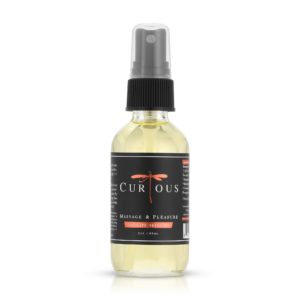Not having a wet vagina can bring the most steamy sexual encounter to a painful interlude, as if your romantic playlist was hijacked by the garish sound of nails scraping a chalkboard. According to statistics, 50 percent of women of all ages (i.e. not just menopausal, perimenopausal or postmenopausal ladies), suffer from a lack of a vaginal lubrication. Around 17 percent of women, ages 18-50, consistently have a hard time enjoying sex due to a lack of natural vaginal lubrication. This is demonstrated by the fact that at any given time of the day or night, at least five people are reading our article on natural lubrication.
According to Elizabeth Moriarty, the formulator of Curious Intimate Massage and Pleasure Oil:
Vaginal dryness is often associated with menopause, but it’s actually very common in women of all ages. First, vaginal dryness can refer to different concerns. Sometimes, we’re talking about the condition of our tissues and daily comfort — even walking and sitting can be unpleasant when tissues are dry! Other times, when we talk about vaginal dryness, we’re referring (specifically) to sexual lubrication. In both cases, hormones are a factor, of course — and hormones are problematically shifty under many conditions.
A lack of proper lubrication can not only make sexual intercourse uncomfortable, but is also quite dangerous. Most women who grit their teeth and do the deed without proper lubrication experience pain and cuts, which can lead to various infections and diseases. The easy fix is reaching for KY Jelly or some other commercial lubrication. But those chemical lubes come with risks such as yeast infections, reproductive damage, lowered immune system, increased risk of birth control, and more.
“The vast majority of lubricants in the marketplace are damaging to women’s health. Not only do they contain toxic ingredients, they’re hyper-osmotic and cause inflammation of our tissues and disrupt cellular turnover, elasticity, and pH balance, resulting in dryness, burning, and irritation,” adds Moriarty.
So why are so many women suffering from vaginal dryness? Besides the obvious menopausal (perimenopausal) lowered estrogen level issues, there are a ton of other factors that may be the culprits. Pinpointing what’s plaguing your vagina is the first step to turning the tide.
13 Reasons Women May Not Have A Wet Vagina
1. Hormonal Imbalances wet vagina
Women of all ages who experience hormonal imbalances are prone to vaginal dryness. Five to 10 percent of teens and young women suffer from Polycystic Ovary Syndrome (PCOS), a condition that lowers estrogen levels. Estrogen is the hormone responsible for making all the fun fluids flow through the vaginal canal. Many people suffer from hormone imbalances today due to the prevalence of antibiotics in our food, plastics that leach out estrogen-mimicking chemicals, as well as estrogen-rich foods.According to Dr. Kecia Gaither, an OB/GYN specialist, “Besides PCOS, other hormonal imbalances linked to vaginal dryness include premature ovarian failure, disorders affecting the thyroid, pituitary, and hypothalamus.”
2. Tampons And Toxic Feminine Hygiene Padswet vagina
Studies show a correlation between tampon use and vaginal dryness. Tampons are great at soaking up menstrual blood, but they can also absorb some of the vaginal moisture and the healthy vaginal bacteria flora. This is especially an issue when women use tampons on light days, or unnecessarily use a “super” tampon. Non-organic tampons can lead to vaginal dryness for different reasons. show dioxins, furans, and pesticide residues in tampons, which have been linked to cancer, reproductive harm, and endocrine disruption.
Tampons contaminated with these chemicals maintain contact with vaginal tissue for hours at a time for several days each month for women who use them. Moriarty warns:
Tampons contribute to the issue, as can non-organic cotton feminine hygiene products! Toxic and carcinogenic chemicals are found in these products (particularly offensive to our bodies given the fact that our vaginal membranes are particularly permeable) including chemical whiteners, , polyethylene (PET), polypropylene, rayon, fragrance, and dyes.
3. Smoking And Drinking wet vagina
If you needed another reason to cool it with smoking and drinking, slippery sex is it! According to Dr. Gaither:
Cigarette smoking contributes to vaginal dryness specifically because it can lower estrogen levels in the body. Alcohol also contributes to vaginal dryness, as one of its effects is dehydration — so indirectly it affects the water levels in the body’s cells — vaginal mucosal cells as well — leading to dryness with sustained use.
4. Postpartum And Breastfeeding wet vagina
Breastfeeding is great for a mother’s health on many levels, however, it also causes pituitary glands to release prolactin, the hormone responsible for producing milk and lowering estrogen levels, which often leads to vaginal dryness. According to Moriarty, “It’s common for women to experience vaginal dryness postpartum and during extended breastfeeding.”
Gaither elaborates on the issue:
Estrogen, one of the female sex hormones, is instrumental in promoting vaginal health by maintaining, among other things, vaginal lubrication. During pregnancy, the level of estrogen increases dramatically — hence many women experience/notice the sensation of increased vaginal discharge. Post delivery, however, there is a massive decline in the amount of circulating estrogen — which is further decreased with breast feeding. For many women, they experience this ‘postpartum vaginal dryness.’
Don’t fret, as estrogen levels will gradually increase post delivery/breastfeeding to normalcy.
5. Women’s Natural Cycleswet vagina
A woman’s ovulation period is the pinnacle of high estrogen levels and natural lubrication. Pre or post-ovulation, women’s estrogen levels lower dramatically. Different women suffer to different extents from the vaginal dryness this leads to. However, every menstruating woman experiences vaginal dryness for the three days before and after their period, and many women have this issue during their period, as well.
6. Hormonal Birth Control Pillswet vagina
For many women, hormonal birth control causes vaginal dryness. The Pill is the biggest cause of this issue, but so are rings and patches. That’s because they all manipulate a woman’s body, mimicking the second half of the menstrual cycle, which is a low-estrogen, high-progesterone state. As we discussed above, when a woman is ovulating, they produce the most estrogen. So hormonal birth control pretty much takes the wet part of a natural cycle out of the picture. Not all women are affected, but if you notice a correlation, consider other birth control options.
7. Soaps And Doucheswet vaginawet vagina
A 2002 study saw a significant correlation between douching and vaginal dryness. Douches commonly include fragrance, which can be made of hundreds of different undisclosed chemicals, some quite toxic, and some certainly associated with allergies — all of which come into direct internal contact with absorptive vaginal mucous membranes. Vaginal deodorants and sprays can also dry up what should be a wet vagina.
Benzethonium Chloride, a preservative, is commonly used in feminine deodorant sprays, powders, and suppositories sold in the United States. This same chemical is restricted from use for leave-on products or products that contact mucous membranes in Canada, Japan, and the European Union due to safety concerns. The best way to ensure everything smells good down there is to make sure your vaginal pH is balanced, which natural intimate massage oils like Curious encourage.
8. Medications wet vagina
A large percentage of women are on medications such as antidepressants, birth control pills, or blood pressure pills. Between 30 and 70 percent of patients managing depression with medication report experiencing some kind of sexual problem, and vaginal dryness is one of the top ones. What’s more, anticholinergic drugs, which are commonly used to treat overactive bladder or excessive sweating, are also known to cause vaginal dryness. Some antihistamines like Benadryl can dry out your vaginal channels, as well. There are natural substitutes for nearly any medication, and they’ll save yourself from vaginal dryness and other nasty side effects.
9. Strenuous Exercise
According to Moriarty, “Athletic women sometimes experience dry tissues, as do some very slender women.” If a women pushes her limits, especially if the said work-out is performed within a few hours of sexual activity, she may experience vaginal dryness. This is especially prevalent with the popularity of HIIT (High Interval Intensity) workouts. Though they have great health and weight-loss benefits, if not incorporated in balanced ways, they can lead to side effects such as vaginal discomforts.
10. Chemo And Other Cancer Treatments
Women who undergo chemotherapy suffer from generalized dryness throughout the body, including vaginal dryness. What’s more, most breast cancer patients who undergo mastectomy are prescribed estrogen containment pills for 5 years or more post breast removal. It is not because estrogen is inherently cancerous, it is that some cancers seem to have receptors for specific hormones and use hormones as a fuel to grow. Meanwhile, lowered estrogen levels causes vaginal dryness.
11. Emotional Stress
In our fast-paced era, nearly everyone is plagued by stress. If you are going through a particularly stressful period, it may be preventing you from experiencing a wet vagina. Dr. Gaither shares:
Emotional stress and other psychological issues have been linked to dyspareunia, low libido, difficulty in achieving orgasm, as well as lack of lubrication — resulting in vaginal dryness. Stress disrupts the hormonal balance, indirectly affecting vaginal health.
Moriarty adds, “Stress not only affects hormone balance, but when it comes to sexual arousal, stress can interfere profoundly.” If this sounds like it may be part of your issue, try some of these top ten ways to manage stress. You can also try massaging your intimate parts with olive oil, which is not only stress-busting, but gets you the wet vagina you want, as well.
11. Not Enough Foreplay
This issue is a fun one to remedy. There’s no formula or time span for how much foreplay is enough to stimulate proper lubrication. Make sure you and your partner give yourselves all the time you need to get the juices stirring.
12. Not Enough H2O
One of the keys to healthy skin is proper hydration, and the vagina has some of the most sensitive skin in your whole body. Regular dehydration can lead to insufficient lubrication, itchiness, burning, and vaginal pain. So make sure you get your daily dose of water. For extra hydration, try putting lemon juice and/or cucumbers in your water.
13. Keep The Pubes
Not only is pubic hair removal torturous, but it can lead to health issues like vaginal dryness, as well. Moriarty explains:
Hair removal is normalized now, but the fact is that it’s there for a reason. Anatomy tends to be like that — not a lot of unnecessary equipment. No one wants to hear this, but hair is hygienic. It draws sweat and funk away from our skin, and our bodies emphasize the use of hair where we most need it for cleanliness.
Studies show that pubic hair removal diminishes general vaginal/sexual health by interfering with balanced vaginal ecology and pH — this biochemical cascade results in dry and irritated tissues. Pubic hair removal is also substantially correlated with an increase in incidence of sexually transmitted infection.
Nothing Should Limit Your Sexual Cravings. Click Here To See How Curious Can Revolutionize Every Moment Of Intimacy
Natural Lube That Actually Solves The Problem – Not Just Bandages It
Although some of the various causes for vaginal dryness may require lifestyle changes and consultations with health experts, there’s one remedy that works across the board: natural lubrication that stimulates the body to produce a naturally wet vagina on its on. Moriarty explains:
When sexual lubrication related to arousal is an issue, it can also be due to anxiety, trust, and relationship struggles, as most of us have experienced. Studies have shown that sometimes our bodies need a bit of wetness as a reminder of sorts to wake our bodies up to begin self-lubricating. Just a bit of lubrication applied to tissues before an encounter can elicit more abundant self-lubricating.
Most of the natural lubricants on the market merely provide short-term relief for feminine issues. However, Curious Intimate Massage and Please Moisturizer is a botanical formula that supports cellular turnover, balanced vaginal pH, and balanced ecology.
According to Dr. Gaither:
A healthy vaginal pH resides somewhere between 3.8-4.5 — slightly acidic. This pH is maintained by constant vaginal secretions and growth of certain bacterial species normally residing in the vagina — like Lactobacilli. This pH serves to guard against infections — an inflamed/infected vaginal mucosa is not going to produce lubrication normally — and as such the woman experiences vaginal dryness. Situations that can exacerbate or predispose a woman to a change in her vaginal pH include menstruation, sex, and douching.
So, Curious can benefit your vagina’s long-term health, so you don’t have to go scrambling for a bottle of lube every time you want to have sex.
Wet Vagina Bliss
Life is too damn hard, as it is. The last thing any women needs is bad, painful sex. It’s time to enjoy the bliss that comes with a wet vagina: long stretches of intercourse, multiple orgasms, and the ability to go at it whenever, wherever you want. So make sure you pinpoint exactly what’s plaguing you down south and take the necessary steps to enjoy a wet vagina.
 Linda Miriam Aziz-Zadeh is a freelance writer and editor who is passionate about preserving the natural beauty and wonder of our bodies, this planet, and the world. She is the cofounder of Crunchy Buzz, a digital wellness marketing firm that serves the health and wellness industry.
Linda Miriam Aziz-Zadeh is a freelance writer and editor who is passionate about preserving the natural beauty and wonder of our bodies, this planet, and the world. She is the cofounder of Crunchy Buzz, a digital wellness marketing firm that serves the health and wellness industry.
Submit your story or essay to Buzzworthy Blogs.
-
Sale Product on sale
 Curious: Intimate Moisturizer And Massage Lotion$35.50 – $212.75Rated 4.93 out of 5 based on 29 customer ratings
Curious: Intimate Moisturizer And Massage Lotion$35.50 – $212.75Rated 4.93 out of 5 based on 29 customer ratings -
Sale Product on sale
 Energy and Love Intimate Bundle
Energy and Love Intimate Bundle$97.69Original price was: $97.69.$94.25Current price is: $94.25.Rated 5.00 out of 5 based on 1 customer rating -
Sale Product on sale
 Women’s Healthy pH Bundle
Women’s Healthy pH Bundle$122.22Original price was: $122.22.$112.25Current price is: $112.25.Rated 5.00 out of 5 based on 2 customer ratings





1 thought on “Wet Vagina Dilemma: 13 Reasons Women Of All Ages Are Dry”
I wonder how laser hair removal would really influence wetness.
Comments are closed.